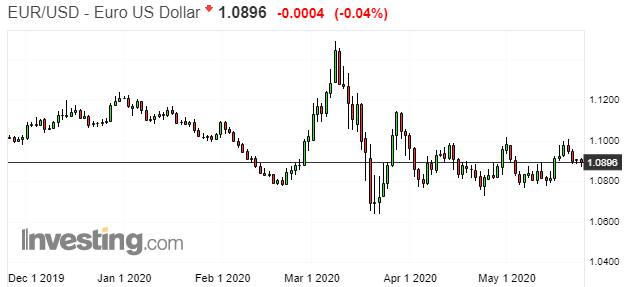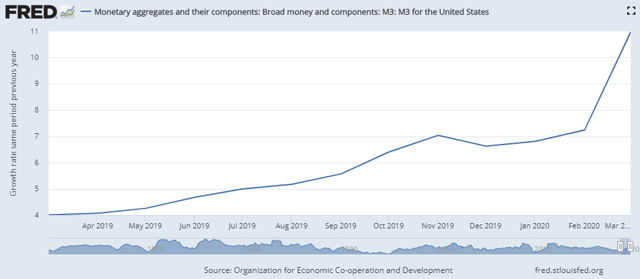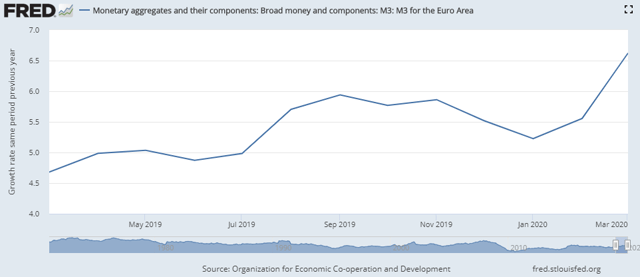Surprising Euro Strength
by Shareholders UniteSummary
- Italian public finances are rapidly becoming unsustainable without the ECB buying large quantities of its debt, the Merkel/Macron plan is no alternative.
- Without ECB buying large quantities of Italian debt, the eurozone would implode, which is the last thing the world economy needs right now.
- But the ECB is hamstrung by internal divisions and a damning ruling from the German Constitutional Court.
- Surprisingly, this situation actually leads to some euro strength.
- But the underlying tensions and fragility of the system very much remain, so we wouldn't get too comfortable with that.
The eurozone is experiencing great stress. Italian debt levels are rapidly becoming unsustainable. Without ECB bond buying, yields would ratchet up pretty quickly, setting in motion a host of self-reinforcing mechanisms.
While the ECB has thrown out the rule book in order to prevent that, it has come under heavy pressure from the Germans and more especially the GCC, the German Constitutional Court, which ruled against it in no uncertain terms.
Despite this obvious uncertainty and fragility, we could actually see euro (FXE) strengthen as a result of a hamstrung ECB, although the joker in the picture is how the pandemic will evolve in the eurozone versus the US, as we will argue.

Italian economy
But parts of the eurozone have been ravaged, like Italy. Participating in the euro has done little good for the Italian economy, which has already experienced decades of stagnation, and on top of that, it has been very hard hit by the COVID-19 pandemic.
It was the first European country experiencing such a massive impact of the virus that it was forced into a lockdown of its economy. This, of course, has crashed its economy and, with it, tax receipts.
As a member of the eurozone, having a prior debt/GDP ratio of 130%+ already, it was in a bad place to respond forcefully to counter the economic impact.
Banca d'Italia has the average forecast for this year for a 9% decline in the Italian economy, but it could easily be worse. Indeed, Morgan Stanley sees a 15% decline of the Italian economy this year.
The same publication mentions European Commission scenarios where the EU economy declines by 10%-15%, and as Italy is one of the worst affected countries, it is likely to be at the high-end of that spectrum should that scenario materialize.
Debt/GDP could rise to an untenable 170% in fairly short order. It's simply the result of a ballooning deficit and a plunging GDP. While Italy's private sector is generating lots of savings, the pandemic is attacking also these to a considerable extent as many people's sources of income have dried up, and they are forced to live of their savings.
Uneven impact
The pandemic has hit the South of the eurozone (bar Greece and to somewhat lesser extent, Portugal) harder, but this is compounded by the fact that they have been less able to deal with the economic fallout, given the fact that their public finances were already in a very bad shape.
Take Germany, for instance, its budget surplus and moderate (60%) debt/GDP ratio have enabled it to produce a massive fiscal response to the crisis, like the 750B euro package announced on March 23, and subsequently, there are additional measures announced like the rescue of Lufthansa and other stimulus measures (Reuters):
Altmaier said the government was considering further measures to help sectors that have been hit particularly hard, such as restaurants, catering and the trade fair industry. The minister also underlined Berlin's plans for a post-crisis stimulus package to support the economic recovery, adding that the government wanted to support private consumption.
It has also fared much better in the pandemic; its early and massive testing regime has paid off relative to other eurozone countries.
So, countries like Italy and Spain were much harder hit and can't respond in the same massive way as the likes of Germany (but also for instance Denmark) to lessen the economic impact of the pandemic.
This is to say the eurozone will experience another round of divergence in economic fortunes that was the result of the financial crisis a decade ago.
Economic impotence
Finding itself in another terrible situation, it is worthwhile realizing that, by virtue of its membership in the eurozone, Italy can't respond in a way that monetary independent countries can. It can't:
- Devalue its currency
- Embark on monetary stimulus or widespread debt monetization
- Embark on a large fiscal stimulus package
Just like in the wake of the financial crisis, it's a sitting duck, and time is running out. While at least some countries issuing their own money can tolerate such high debt/GDP ratios (Japan's ratio is even much higher at 250% of GDP), a country which isn't master of its own monetary affairs most definitely cannot.
That is, without any kind of massive intervention, this is a trainwreck waiting to happen of which we wrote quite a few times before. Given the size of the Italian economy and its outstanding debt, an Italian debt crisis would be a financial catastrophe and the last thing we need right now.
Transfer Union
The impact is also uneven in the US, but weaker states and/or those where the pandemic impact is much larger are helped by automatic transfers from the Federal government.
The simple truth is that, unlike the EU budget, which is roughly 1% of EU GDP, the US Federal budget is much larger (in excess of 20% of GDP) and this difference in size makes a dramatic difference.
States in a weak position automatically generate less taxes and qualify for more Federal programs (Medicare etc.), and this automatically redistributes means from strong to weak states without anybody (bar economists) noticing.
Mitch McConnell, the Senate majority leader, argues against a Federal bailout of blue states, without apparently realizing that these same blue states are permanently 'bailing out' his own Kentucky via the mechanism just described above.
Since neither the EU, nor the eurozone, is ruled by a sufficiently large central budget to allow a similar automatic redistribution from strong to weak members, mechanisms have to be set up to achieve the same.
The main mechanism is the ESM, the European Stability Mechanism. Its modality is that countries in economic distress can resort to cheap but conditional ESM loans.
A dangerous game of chicken
That conditionality entails that these loans come with strings attached in the form of demands on public finances and economic reforms. The world has been able to see what that entails in the Greek debt saga, where Greece was forced to a series of (normally sensible) structural reforms but also to embark on unprecedented austerity measures in the midst of an economic slump, which has been counterproductive and is part of why the Greek economy slumped 25% in the past decade.
Italy has a similar albeit somewhat less dramatic experience. The upshot is that these countries don't want to be subject of the same conditionality, and in any case, one could argue that a country which is already experiencing its debt/GDP ratio veering off towards 170% of GDP should not be burdened with even more debt.
In short, loans, conditional or not, are basically a non-starter for Italy, and quite a few politicians have publicly said so. They will simply not request any funds from the ESM as long as these come in the form of conditional loans.
Basically, what the Italians are doing can be described as a game of chicken with the ECB. The latter knows that it is forced to buy up Italian debt to prevent all kinds of self-reinforcing feedback mechanisms turning on and rapidly run out of control, like:
- A crash in Italian bonds, spiking the spread over German bonds and making refinancing its existing debt ever more expensive, which busts Italian public finances even more, forcing it to issue even more debt, etc.
- Crashing bonds busting the holdings of Italian banks (which are the biggest holders), needing a giant bailout which worsens Italian public finances and hence crashes its public bonds even more.
- Giant capital flight which sucks the Italian economy dry, as euros can just as well park in Germany rather than in Italy, and the movement doesn't even produce any offsetting Italian currency depreciation.
- Spread to other countries' sovereign debt and banks.
This would rapidly spiral out of control, bar some kind of massive intervention.
The German Constitutional Court
That massive intervention holding Italian doom scenario's at bay (for now) is the ECB, which is embarking on a massive bond buying program, and this bond buying is heavily skewed towards buying Italian bonds.
The problem is, this is against the rules:
- The ECB is allowed to buy bonds but on a weighted basis, according to the paid in capital ratio of member states. That is, it should buy many more German bonds than Italian bonds, but this doesn't serve any economic purpose.
- It amounts to direct bailout of the Italian government.
So, the GCC, the German Constitutional Court in Karlsruhe, in what is likely to be an epoch defining ruling, spoke out against the ECB's unlimited bond buying and the ECJ rubberstamping it in no uncertain terms, challenging the supremacy of Community law in the process.
In a further escalating round, the EU Commission reasserted the primacy of Community law and vowed to bring infringement proceedings against Germany. It is difficult to see how this can have a happy ending.
The Bundesbank, which carries out the lion's share of the bond buying program, is now put in the rather unenviable position of having to defend the ECB's independence while disagreeing with its policies, and it might even have to withdraw from its bond buying should the GCC persist.
And indeed, the ECB seems to be preparing how to proceed with the bond buying program without the Bundesbank.
On the other hand, not everybody was impressed by the GCC's verdict, and it can be argued that it is an attack on the ECB's independence and that the ECB isn't overstepping its mark in the first place, that is, its policy actions can be explained as being viable within its mandate.
In addition, the ECB seems happy enough to expand its bond 750B euro buying program, but we are pretty sure not everybody is on board on that.
The Merkel surprise
The GCC verdict does seem to have moved German Chancellor Angela Merkel to give up her resistance to debt mutualization at least in principle. She agreed with French President Macron to have the Commission borrow 500B euro to provide grants to member regions and industries hit hardest by the pandemic.
Merkel seems to have arrived at the conclusion it was now up to us, the governments after the GCC verdict, and she sees a survival risk to the EU if governments don't act.
This is pretty historic. However, some perspective is warranted:
- It's a temporary measure, not the road to a permanent transfer union.
- It's part of the EU budget (which is already having problems filling the hole the UK left).
- The Commission will come with its own proposal.
- It looks to be a sort of addition to the regional funds but concentrated on four areas (health, economic recovery, ecological and digital transition and industrial sovereignty). As such, it is likely to be widely dispersed throughout much of the EU. This isn't going to do much, if anything for Italian spreads.
- The grants come with strict conditions (probably akin to existing ones of the regional funds).
- On top of that, it's likely to be watered down, as there is opposition from the so-called frugal four (Austria, Sweden, Denmark, and the Netherlands).
That is, it is helpful and a fairly brave step from Merkel, but it isn't going to solve the problem of Italian debt sustainability.
The euro
While the Fed has pulled all the plugs and has embarked on numerous asset buying programs, the ECB has been hamstrung through internal division and a potentially mortal external threat in the form of the German Constitutional Court.
For EURUSD, this sets in motion two opposing forces:
- Money growth is likely to be higher in the US, favoring a strengthening euro.
- Insofar as the much bigger fiscal and monetary stimulus in the US leads to a stronger recovery in the US, this favors the dollar over the euro.
On the money growth, here is M3 growth in the US:

And here is the eurozone equivalent:

Pandemic
The wild card here is the evolution of the pandemic. Swathes of the eurozone and the US have been badly affected due to bungled and late responses from policymakers.
Yet the pandemic seems more under control in the eurozone than it does in the US. If this scenario continues, the relative euro strength we're predicting could be upended by the pandemic.
Conclusion
While brave, the Merkel/Macron plan isn't going to make Italian public finances sustainable, and the plan might not even survive in its present form as not all member states are on board.
That is, keeping Italian bond yields from spiraling upwards is still the domain of the ECB, but compared to other central banks, it's hamstrung by internal divisions and a pretty damning GCC ruling.
The counterintuitive result is that situation is actually conducive to euro strength basically because there is a lot less money creation in the eurozone compared to the US, which has embarked on a bigger stimulus package.
It remains to be seen how long that lasts, though. The evolution of the pandemic is likely to interfere with this, and the eurozone, as a half-baked monetary union without a central budget, remains extremely fragile.
Disclosure: I/we have no positions in any stocks mentioned, and no plans to initiate any positions within the next 72 hours. I wrote this article myself, and it expresses my own opinions. I am not receiving compensation for it (other than from Seeking Alpha). I have no business relationship with any company whose stock is mentioned in this article.